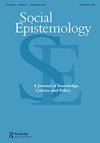一些阴谋论
IF 2
2区 哲学
Q1 HISTORY & PHILOSOPHY OF SCIENCE
引用次数: 6
摘要
关于阴谋论的哲学研究的一个显著特征是,大多数哲学家都认为阴谋论(也就是特殊论的论点)本质上没有问题。然而,最近的研究对这种共识观点提出了挑战,认为阴谋论(又名泛论)在认识论上确实存在一些错误。特殊主义和普遍主义是不相容的吗?通过观察特殊论者和通才们为了使他们的理论观点兼容而不得不付出的代价,我将论证特殊论者可以接受许多激发通才论的担忧,因为通才论永远不可能是关于“所有”阴谋论的,而不是非历史的或非政治的。最后,通才式的评论最好被看作是评估特定阴谋论的有用指南或考虑因素。本文章由计算机程序翻译,如有差异,请以英文原文为准。
Some Conspiracy Theories
ABSTRACT A remarkable feature of the philosophical work on conspiracy theory theory has been that most philosophers agree there is nothing inherently problematic about conspiracy theories (AKA the thesis of particularism). Recent work, however, has challenged this consensus view, arguing that there really is something epistemically wrong with conspiracy theorising (AKA generalism). Are particularism and generalism incompatible? By looking at just how much particularists and generalists might have to give away to make their theoretical viewpoints compatible, I will argue that particularists can accept many of the concerns that motivate generalism because generalism can never be about ‘all’ conspiracy theories without being either ahistorical or apolitical. In the end generalist critiques are best seen as useful guidelines or considerations for the appraising of particular conspiracy theories.
求助全文
通过发布文献求助,成功后即可免费获取论文全文。
去求助
来源期刊

Social Epistemology
Multiple-
CiteScore
2.60
自引率
17.60%
发文量
60
期刊介绍:
Social Epistemology provides a forum for philosophical and social scientific enquiry that incorporates the work of scholars from a variety of disciplines who share a concern with the production, assessment and validation of knowledge. The journal covers both empirical research into the origination and transmission of knowledge and normative considerations which arise as such research is implemented, serving as a guide for directing contemporary knowledge enterprises. Social Epistemology publishes "exchanges" which are the collective product of several contributors and take the form of critical syntheses, open peer commentaries interviews, applications, provocations, reviews and responses
 求助内容:
求助内容: 应助结果提醒方式:
应助结果提醒方式:


